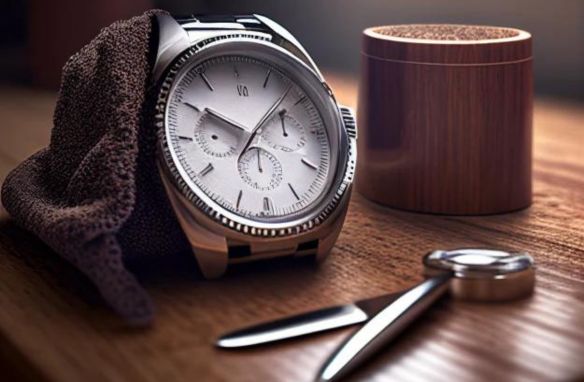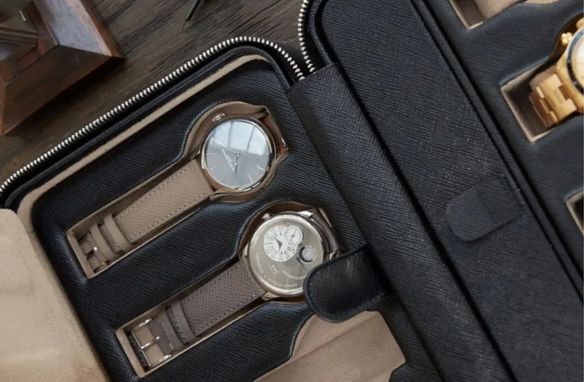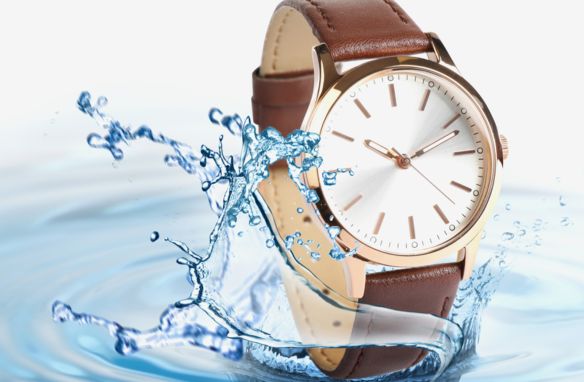Introduction
A watch is more than just a timekeeping device; it’s a precision instrument that requires proper care to maintain its functionality and value. Whether you own a luxury timepiece or a cherished everyday watch, understanding how to care for it can significantly extend its lifespan and ensure it continues to perform accurately. In this guide, we’ll cover essential maintenance tips to help you keep your watch in optimal condition.
Regular Cleaning: Keep It Looking New

- Description: Regular cleaning helps remove dirt, grime, and oils that can accumulate on your watch over time. Proper cleaning ensures your watch remains in good condition and retains its aesthetic appeal.
- Tips for Cleaning:
- Straps: For metal bracelets, use a soft brush and mild soap with water to gently clean. For leather straps, use a dry, soft cloth to avoid damaging the material. If needed, use a leather conditioner to keep the strap supple.
- Case: Wipe the case with a damp cloth to remove surface dust. Avoid using harsh chemicals or abrasive materials that could scratch the surface.
Water Resistance: If your watch is water-resistant, make sure to follow manufacturer guidelines for cleaning. Avoid submerging watches without confirmed water resistance
Regular Servicing: Maintain Accurate Timekeeping

- Description: Regular servicing is crucial for maintaining the accuracy and longevity of your watch. Over time, internal components can wear out or accumulate dust, affecting performance.
- Recommended Service Intervals:
- Mechanical Watches: Typically require servicing every 3-5 years to ensure the movement remains in good working condition.
- Quartz Watches: Should be serviced if you notice irregular timekeeping or after changing the battery.
- Service Checklist: During servicing, a watchmaker will inspect and clean the movement, replace worn parts, and lubricate components as needed.
Proper Storage: Protect from Damage

- Description: Proper storage is essential to protect your watch from physical damage, moisture, and extreme temperatures. How you store your watch can impact its condition and performance.
- Storage Tips:
- Watch Box: Store your watches in a watch box or case with separate compartments to prevent scratches and keep them organized.
- Avoid Direct Sunlight: Store your watch away from direct sunlight to prevent damage to the dial and strap.
Temperature and Humidity: Keep your watch in a stable environment, avoiding extreme temperatures and high humidity which can affect the movement and materials
Handling with Care: Avoid Common Hazards

- Description: Proper handling can prevent unnecessary wear and tear on your watch. Avoid exposing it to situations that could cause damage or stress.
- Handling Tips:
- Avoid Impact: Be cautious of potential impacts or shocks that could damage the movement or case. Remove your watch before engaging in activities that may expose it to physical stress.
- Chemical Exposure: Avoid contact with chemicals such as perfumes, cleaning agents, and cosmetics that could damage the watch’s materials or finish.
Winding and Adjusting: Wind and adjust your watch gently, following the manufacturer’s instructions to avoid damaging the movement
Battery Care: Replace When Needed

- Description: For quartz watches, battery maintenance is essential for consistent performance. A dead battery can lead to leakage and potential damage to the movement.
- Battery Tips:
- Regular Replacement: Replace the battery at least every 2-3 years, or sooner if the watch shows signs of losing power.
Avoid Delays: Don’t wait until the battery is completely dead; replace it promptly to prevent leakage and damage to the internal components
Water Resistance Checks: Ensure Proper Function

- Description: Water resistance is a key feature for many watches, but it can deteriorate over time due to wear and tear. Regular checks ensure your watch remains protected from moisture.
- Water Resistance Tips:
- Check Seals: Have the seals and gaskets checked during servicing to ensure they are intact and functioning properly.
- Avoid Extreme Conditions: Even if your watch is water-resistant, avoid exposing it to extreme temperatures, saltwater, or high-pressure environments.
Professional Help: Know When to Seek Assistance

- Description: While routine care can be performed at home, some issues require professional expertise. Knowing when to seek help from a watchmaker can prevent further damage and ensure proper repairs.
- When to Seek Help:
- Performance Issues: If your watch is running inaccurately or has stopped working.
- Physical Damage: For repairs related to the case, crystal, or bracelet.
- Servicing: Regular maintenance or complex issues should be handled by a professional watchmaker.
Conclusion
Caring for your watch is essential to preserving its functionality, appearance, and value. By following these maintenance tips, you can ensure your timepiece remains in excellent condition and continues to serve you well for years to come. Regular cleaning, servicing, and proper storage are key to keeping your watch running smoothly and looking its best.


